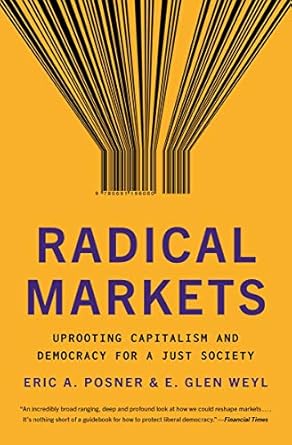| Kindle Price: | ¥3,279 (Tax included) |
| Amazon Points:
+33 pt (1%) | |
Your Memberships & Subscriptions

Download the free Kindle app and start reading Kindle books instantly on your smartphone, tablet, or computer - no Kindle device required.
Read instantly on your browser with Kindle for Web.
Using your mobile phone camera - scan the code below and download the Kindle app.



 Audible sample
Audible sample Radical Markets: Uprooting Capitalism and Democracy for a Just Society (English Edition) Kindle Edition
Revolutionary ideas on how to use markets to achieve fairness and prosperity for all
Many blame today's economic inequality, stagnation, and political instability on the free market. The solution is to rein in the market, right? Radical Markets turns this thinking on its head. With a new foreword by Ethereum creator Vitalik Buterin and virtual reality pioneer Jaron Lanier as well as a new afterword by Eric Posner and Glen Weyl, this provocative book reveals bold new ways to organize markets for the good of everyone. It shows how the emancipatory force of genuinely open, free, and competitive markets can reawaken the dormant nineteenth-century spirit of liberal reform and lead to greater equality, prosperity, and cooperation.
Only by radically expanding the scope of markets can we reduce inequality, restore robust economic growth, and resolve political conflicts. But to do that, we must replace our most sacred institutions with truly free and open competition—Radical Markets shows how.
- LanguageEnglish
- PublisherPrinceton University Press
- Publication dateOctober 8, 2019
- File size2683 KB
Product description
Review
"A brilliant, provocative work."--Jason Furman, former chairman of President Obama's Council of Economic Advisers
"This is free market thinking but not as we know it."--Diane Coyle, Prospect
"Refreshing and welcome in its willingness to question received wisdom."--The Economist
About the Author
Product Details
- ASIN : B07TP5HLWQ
- Publisher : Princeton University Press (October 8, 2019)
- Publication date : October 8, 2019
- Language : English
- File size : 2683 KB
- Text-to-Speech : Enabled
- X-Ray : Enabled
- Word Wise : Enabled
- Print length : 391 pages
- Amazon Bestseller: #50,568 in Foreign Language Books (See Top 100 in Foreign Language Books)
- #64 in Free Enterprise (Foreign Language Books)
- #96 in Economic Policy
- #100 in Economic Policy & Development
- Customer Reviews:
About the author

Discover more of the author’s books, see similar authors, read book recommendations and more.
Customer reviews
Top reviews from Japan
There was a problem filtering reviews right now. Please try again later.
-
Reviewed in Japan on May 30, 2019著者は所得の不平等や政治の分極化を問題と捉え、市場の力を利用する5つの改革を提言していく。
19世紀の小作人はどれほど仕事ができても土地を手に入れることは地主の同意抜きにはできず、配分の効率性が損なわれる状況だった。いっぽうで自分の手にあるものはなんとかして改善しようという意欲が湧くもので、これは投資の効率性という特徴と呼べる。著者は均質な財以外だとどんなものでもその所有を認めると分配効率を歪める(一番うまく使える人に行き渡らない)ことを問題と捉えている。取引費用を避けて会社という形態になってもやはり市場支配からの賃金悪化や価格吊り上げという問題が残ってしまう。そこで彼らはヘンリージョージやハーバーガーやとりわけビックリーの提案に倣い、競売の常態化と共有自己申告税(common ownership self-assessed tax, COST)を導入したらいいとしている。これは工場だろうが家だろうが車だろうが競売にかけ、最高の利用料を提示した者が使い、それ以上に提示する者が現れたら譲り渡すという提案だ。利用料として集められた金は公共財の支払いと社会給付に充てるとされている。利用料が高いほど課税される仕組みだ。ここでは真の価格を表明する動機があり(上げたら無駄に税を払うことになるし、下げると他の人に取られる可能性が上がる)、投資効率は確かに抑えられるものの高額の利用料については税率を下げればその悪影響は減る。少しの課税でも正しい自己申告を導き、投資はそこまで歪めないというわけだ。シグナリングや逆選択もまた保有効果も避けることができる。またこの提案のもとでは資産の価値は利用料として低額に抑えられるため、借り入れ制約という問題も生じにくくなる。私的所有のもとでは怠慢になりがちだけどCOSTのもとではそんなことでは競争に負けてしまうから皆勤勉になるのだ。周波数帯オークションは一回しかされなかったからその所有者となった人が額を釣り上げるという結果になったしドメイン名が不適切な人物にわたる可能性があるけどCOSTだと常に競売にかけられているからこのようなことは起こらない。空港や鉄道は地主に妨げられることなく作ることができるようになるし、給付は平等化を促す。
市場ではたくさん支払う意思を見せることである財やサービスをどれくらい好んでいるか示すことができる。それに対し一人一票の民主主義はいくつもの欠点を抱えている。少数派の権利を守ることはできず、身動きが取れなくなったり、戦略的投票により悪い代表を選ぶこともあり、多数決を複数回行うことで独裁が生じることもあり、人々がどれだけ望んでいるかやどれほど詳しく知っているかをまとめ上げることができない。古代アテネやアメリカ建国、ヒトラーなど歴史に例は多い。そこで著者は伝統にならい政治を公共財の提供として捉えていく。適切に供給されるためには各人の声はその公共財を欲していればいるほど聞き入れられなくてはならないが、普通の市場ではこの結果は得られない; 一番気にする人が誰よりも支払う意思を見せてその他の人を追い出すからだ。投票により他人に迷惑をかけたぶんだけ支払うようにしないと最適な結果は得られない。ここで、支払うべき価格はその人がどれくらい結果に影響するかではなく、その「自乗」に比している。たとえば汚染しながら電力を供給するプラントを考えてみよう。誰かが汚染量を減らしてほしいと思ったとき、他の人は電力消費を減らす結果になる。電力消費は減れば減るほど汚染によって得られたはずの便益は大きくなるので、彼の減量要求は1単位ごとに過大な負担を強いていくことになるのだ。ここにきてついに著者は「自乗投票(Quadratic Voting, QV)」を提言する。まずある国が何度も選挙するとして、1回1回各人は票を貯めても良いことにする。そして投票すると決めたときは貯めた票数の平方根のぶんだけ票としてカウントされるようにしようというシステムだ。これは自分が投票して迷惑をかけた人に対して「自乗」ぶんだけ票を支払うことになり、フリーライドの問題は生じず社会的に最適な結果をもたらす。実験するとリッカート尺度よりQVの方が正規分布に近いような形になる。レビューサイト等で応用できるしもちろん政治の場でも利用できる。ある選択肢をどれだけ好んでいるかまで表明できるから、嫌な候補者を罰することができるのだ。平等な社会への第一歩を踏み出せる。
18世紀は皆が貧しく、誰がどこに移住しようと利益はなかった。しかし貿易は富を生むため、貿易論が発達した。世界的には所得の格差が大きい。ここで著者はビザのオークションを提唱する; 一番高く支払う意欲を見せた人に落札させ、そのアガリは公共財や給付に回すというものだ。ベッカーのアイデアにさらに一捻り加わっており、それは政府が主催するのではなく国民一人一人や共同体ごとに主催する(Visas Between Individuals Program, VIP)という点だ。望ましい条件を飲んでくれる人だけが来る結果にできるし、それなら混乱は起きないし次第に理解も進むとのこと。
機関投資家は1980年にはすべての法人のうち4%の株を持っているに過ぎなかったが近年では26%も持っている。同一業界の会社をいくつも抱えているため競争を阻害するような行動に出ることがある。例えば、価格を上げたり投資を控えたりするようCEOに直接指示することもある。労働市場においても同じように談合をして労賃を値切ってしまっている。そこで著者は物言う株主としてはどの法人についても1%のシェアを超えさせないよう規制することを提言する。いくつもの業界を跨いで資産を振り分ければリスクは減るから資産運用はあまりダメージは受けないし、一方企業間の競争は労働者を確保する市場でもまた保たれるのだ。機関投資家同士の競争は、いかにしてしっかり企業を株主のために働かせるかという点で生じるようになる。
計算機能とデータの量の向上はニューラルネットワークなど機械学習の有効性を飛躍的に高めた。これまでの普通の統計に必要だったデータ数はせいぜい数百程度なので末端ユーザが加えるデータはほとんど意味がなかった。しかしこれからは大量のデータが必要となるため各人が持ってくるデータはとても価値があるのだ。ここで著者はデータを労働として捉えるよう提言する。現状ではテクノロジー企業は貴族のように振る舞いデータ市場を買い手独占してろくに支払っていない。これでは質の高いデータをユーザが持ってくる動機はない。そこで労働組合を作るよう全ユーザに呼びかけてデータに対する支払いがなされるようになればもっとサービスの質も向上するし社会貢献しているという実感も生めると見ている。
COSTを人的資本にかければ才能のないものに対しても今よりは不平等が減るかもしれないし、国際社会でQVを導入すれば弱い国が無視されることはなくなる。VIPで来た移民にQVを認めればより良い移民を引きつけることができるかもしれない。計算能力が発達してテクノロジー企業は市場と同じようなサービスを提供しているようになってきているとはいえ、上記の5提言をまとめてより良い社会を作るのが現状では最善ではと見ている。
ミクロ経済の本としてここ10年で一番刺激的な本。すごくオススメ。
Top reviews from other countries
-
 Rogger-kappelerReviewed in Germany on August 23, 2021
Rogger-kappelerReviewed in Germany on August 23, 20211.0 out of 5 stars Die Autoren sind für radikalen Markt, kehren damit aber das Eigentum wie das Kind mit dem Bade weg
Verified PurchaseAusgehend von der immer ungleicheren Vermögensverteilung wollen die Autoren, dass die Steuerzahler ihre Vermögenswerte selbst bewerten und zu diesem Wert versteuern - und alle andern Bürger dürfen ihnen diese Werte zu diesem Preis abkaufen, auch persönliche Sachen und das Haus. Ausserdem sollen diese Werte mit 7% pro Jahr besteuert werden. Das Ergebnis - sehr amerikanisch - niemand hat nach 14 Jahren noch Vermögen, alles wird vorweg konsumiert, Schulden sind wohltuend, und, hier beginnt schlichter Kommunismus, der Staat hat alles. Das ist ihnen die Alternative zur Vermögenskonzentration: der Reichste, der Staat, wird noch reicher.
Aehnlich unüberlegt: der Wähler soll seine Stimme über mehrere Abstimmungen weg aufsparen und dann aber gehäuft abgeben dürfen. Das verzerrt Volksentscheide schlimmer als alle Vorbehalte, die manchmal geäussert werden. Manche sparen dann ihre Stimme, und wenn es heisst, "Scharia einführen", stimmen sie sieben Mal ja.
-
 Rodolfo SanchezReviewed in Mexico on April 2, 2019
Rodolfo SanchezReviewed in Mexico on April 2, 20195.0 out of 5 stars Excelente calidad
Verified PurchaseLibro muy recomendado
 David P. HaritonReviewed in the United States on January 10, 2019
David P. HaritonReviewed in the United States on January 10, 20195.0 out of 5 stars An analytic, thought-provoking and constructive book
Verified PurchaseThis book points out obviously problems with the way society is currently organized and then makes simple proposals for organizing markets in entirely different ways to achieve better outcomes. Reading it is a valuable exercise for anyone involved in formulating policy. Much of what is happening today is in fact a reorganization of markets and society. Airbnb has already changed the nature of property ownership. Why not stop to think creatively and proactively about how we might tax property ownership to achieve better and more flexible social objectives? If you don't like the authors' proposals, what do you think might work better? The answer "whatever we're already doing right now" is not a good one, particularly given the degree to which technology has changed and is changing. The book is clear in setting out some of the problems. When it comes to voting, for example, the book does a nice job of laying out the classic problems with organizing a democracy. Some of these problems are prominent right now. You may not think that quadratic voting is the solution, but it is worth spending a last a bit of time asking yourself what might be a better approach, and you'll enjoy the process of asking yourself how a different approach would work. I really appreciated the opportunity this book gave me to do precisely that.


































